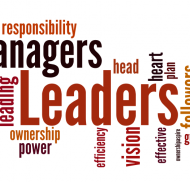Posted by Managementguru in Business Ethics, Business Management, Decision Making, Principles of Management, Strategy
on Mar 11th, 2014 | 0 comments

Spirituality and Management The purpose of correlating spirituality and management might present a weird picture to some. Research of the old Hindu scriptures, epics and Vedas disclose the secrets of management etiquettes coated with spiritual sugar which serves as a road map for us to cherish and follow. As an ardent follower of the BHAGAVAT GITA, THE UNIVERSAL BOOK OF SPIRITUAL SCIENCE, it was really amazing for me to know that the core principles of management have already been defined and dealt with that were formulated at a later date by MANAGEMENT GURUS like PETER DRUCKER, HENRY FAYOL, C. K. PRAHALAD and the like. I would like to present four qualities that struck me while I was comparing and contemplating. PERCEPTION AND UNDERSTANDING THE INNER SELF SELF MOTIVATION AND SELF TRANSCENDENCE DUTIES AND RESPONSIBILITIES LEADERSHIP The Leader and the Manager: The LEADER IS BEING FOLLOWED willingly, but a manager has to command individuals in order to adhere to his instructions. So, being a good leader starts from soul searching or understanding the nature of one’s inner self. SELF CONCEPTION gives a different dimension to approach problems. Spiritual experiences induce clarity in thinking that leads to ethical decision making. The spiritual experiences of Arjuna, one of the PANCHA PANDAVAS with LORD KRISHNA made him stronger (at will) and sharper (right perception). Decision Making: “I am the strength of those who are devoid of personal desire and attachment. O Arjuna, I am the legitimate desire in those, who are not opposed to righteousness, “says Lord Sri Krishna. At the war front, Arjuna the GREAT WARRIOR is not sure whether to fight against his own kith and kin. The inspiring words of Krishna motivated him to come out from the state of INERTIA and enter RIGHTEOUS ACTION. It is a testimony of what philosophers call the transcendence from alienation to self confidence to reach ethical decision making. One can never forego his duty or responsibility, be it his personal life or in the management arena. EFFECTIVENESS IS DOING THE RIGHT THINGS EFFICIENCY IS DOING THINGS RIGHT Management Lessons from Mahabharata from Parth Acharya Forming a VISION, planning the right Strategies, pooling the resources, hiring right people for the right job, setting goals and objectives, reviewing by MANAGEMENT BY OBJECTIVES, MANAGEMENT BY EXCEPTION, rewards and recognition, all have been dealt with a masterly excellence in MAHABARATHA which talks about the GURUKSHETRA WAR between the PANDAVAS and KAURAVAS or to simply put it, between THE GOOD AND THE EVIL. “The Supreme Lord is situated in everyone’s heart, O Arjuna, and is directing the wanderings of all living entities, who are seated as on a machine, made of the material energy.”Mind can make you LIBERATED OR BONDED that depends upon your WILL to master it or be a slave. Controlling your mind in turn controls your actions and thought process that leads to well augured efforts that proves fruitful to the human race. Leaders are born and not made goes the saying. But if you are able to be THE MASTER OF YOUR MIND, you are a leader made. Management Lessons from THE BHAGAVAT GITA Applicable to both western and Indian school of management, THE BHAGAVAT GITA deals with problems at the GRASS ROOT LEVEL relating to THE HUMAN PSYCHE. Management lessons from Bhagvad gita from singhm91 It enlightens us on all managerial techniques, goading us towards a serene atmosphere and state of affairs in place of the conflicts, stress, and lack of co-ordination, common in most of the enterprises world wide. “Do your duty perfectly, and the results will follow suit”, is the crux of GITA. How many of us...

Posted by Managementguru in Business Management, Decision Making, Principles of Management
on Mar 6th, 2014 | 0 comments

A Process of Intelligence Effective Decision making is a process of Intelligence, Design and choice activities and “is a central part of the management process”. Decisions are hard to make but once decided there should be no second take. The following steps are involved in the process of Decision-making: 1. Recognizing the problem 2. Deciding priorities among problems 3. Diagnosing the problem 4. Developing alternative courses of action 5. Evaluating alternatives 6. Selecting the best alternative 7. Effective implementation and follow-up action. Recognizing the Problem– Herbert A Simon calls this step as an “intelligent activity“. It is important to find out whether there is any deviation from the past experience. For e.g. Sales might decrease, expense might decrease, sometimes there might be deviations from the plan, sales budget, and competitors may outperform by improved systems. Deciding priorities among the problems: A manager would face many problems at the same time. He should not be bogged down with small and unimportant problems. Some problems can be easily solved by the sub-ordinates. Some may not be important. A manager must see that – he selects carefully the most important problem. Peter Drucker says that “once the right problem is perceived then half of the problem is solved”. A manager must diagnose carefully by asking the following questions. a. What is the real problem? b. What are the causes and effects of the problem? c. Is this problem very important? d. Can they be solved by sub-ordinates? e. Which is the right and most important problem to be solved? Diagnosing the Problem: After choosing the right problem the manager must now start diagnosing the problem. There is no simple answer to the question of how to diagnose the problem, because every individual differs in his or her own way of diagnosing the problem depending on the different background orientations and training. A manager must systematically analyze the problem for identifying the alternative causes of action. Developing Alternative Courses of Action: This step is creative and innovative where a manager analyzes from all perspectives Sometimes a manager can also use a technique called “brainstorming” where a few individuals discuss at length the various possible available alternatives. First of all, a manager must be thoroughly familiar with the problem. This is called saturation. Later, he must think about the problem from several view-points which is called deliberation. Sometimes the manager may not get into the crux of the problem, i.e. there may not be any fruitful result of deliberation, and then the manager might temporarily switch off his conscious search and relax. This process of realization is called incubation. Then after sometime, a flash of light may occur, and the manager may get some insights and ideas. This stage is called illumination. In the last stage, which is called accommodation, the manager resynthesises his ideas into a usable proposal. Evaluating the Alternatives: The manager must now give proper weightage to the positive and negative aspects of the alternatives and evaluate by using some criteria like (a) time; (b) cost; (c) risk; (d) results expected; (e) deviations anticipated; (f) resources available for implementation. Selecting the Best Alternative: This is the most important step where the manager selects the best alternative that will yield maximum profits or results with minimum cost, input or resources. To put it in simple terms, the solution should be able to solve the problem in the best possible way. Effective Implementation and Follow-up Action: Any decision without proper implementation becomes futile and hence proper care must be taken by the manager to pool resources and start implementing the decision taken. In large organizations, follow-up procedures are available in the system...

Posted by Managementguru in Human Resource, Organisational behaviour, Principles of Management
on Feb 28th, 2014 | 0 comments

An Open Frame of Mind: Line and staff authority should be open with each other and come out of their compartmentalized state of mind. Rationale thinking and logical action is what is required to understand and resolve conflicts.Be a Manager rather than a Technocrat: Specialization has made people to stick to their line of action and they act merely like tech wizards and conveniently forget the human element of flexible mental purview and compromise. Development of each individual’s managerial qualities will minimize conflicts. A manager has to harmonize functions of diverse natures and bring about co-ordination.Think as an Entrepreneur: Thinking about the strength, weaknesses, opportunities and threats an organization faces makes each individual realize that he or she is part of the organization and whatever happens to the firm directly affects his/her stability and security.Make others feel a Sense of Achievement: It is the job of a manager to appreciate and encourage the achievements of his sub ordinates that bring greater joy in the minds of individuals and motivate them to work for the cause.Interaction among Functions: Cross functional interactions on a continuous basis are found to be useful in preventing and resolving conflicts. Informal groups serve as the best example of a committee consisting of members from different functional groups but with a common interest. These groups can be best identified and utilized by the management to resolve conflicts by seeking the help of the key person in the group.Roles, Responsibilities and the Scope of other Functions: The basic requirement is to first clearly define the objectives and sub objectives, the process, the roles of each function as a tool and their rights and responsibilities. One should know the roles and responsibilities of all functions having common interface: their position in the firm as well as their relevance and contribution towards the organizational goals.Communication and Information Sharing: The informal communication system helps in achieving group dynamics and cohesion while the formal channels take care of organizational directives. A quick and effective means of communication can considerably reduce the conflict level that arises out of communication disorders.Adequate Planning and Co-ordinations: At each operational level, hasty actions must be avoided to stop conflicts from arising. Planning and Co-ordination go hand in hand: Say, if a new product launch is aimed at without proper promotion, what would happen to the success of the project?Evaluation of Functional Performance: A standard mechanism must be set to evaluate managerial performance in terms of their ability to achieve an integrated set of objectives in a balanced manner.Necessity of Transparency: Transparency is needed at all functional levels or the initiator appears to be tainted with the accusation of having an ulterior motive. In case of big corporate firms all the policy decisions are taken by the board and not by a single person to avoid conflicts. Conflict need not necessarily be viewed as an evil but a disorder to be curbed. Sometimes a conflict might showcase the inherent inflexibility and malfunctions in the firm to be corrected paving way for innovations. Sometimes it causes frustration for the management by preventing synergy amongst the sub-systems. All said and done, conflict once identified have to be immediately dealt with and resolved by the management in order to facilitate smooth functioning of the...






